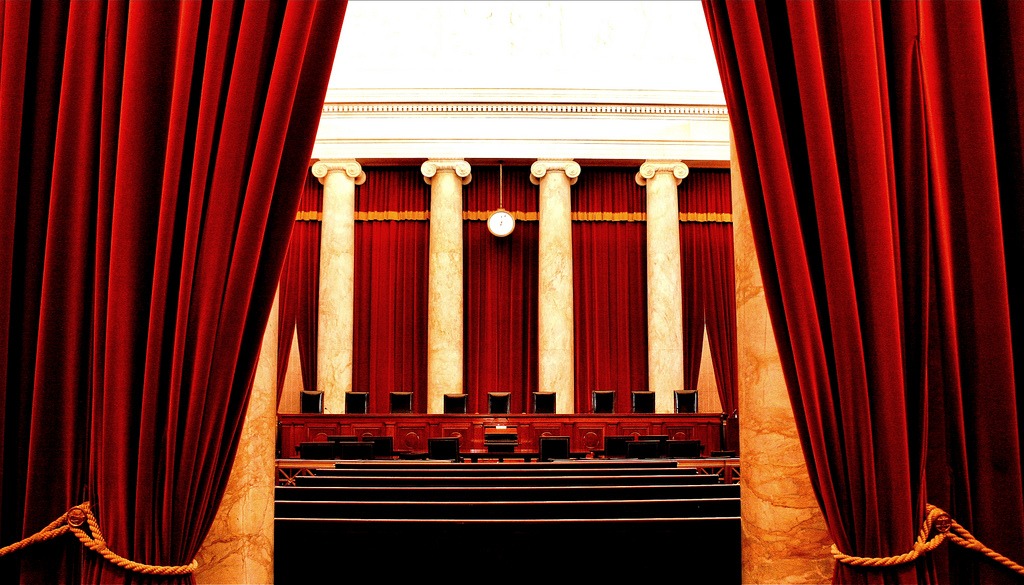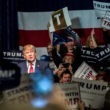On March 9, 1937, American radio listeners were treated to some of the most concentrated hogwash in the nation’s political history. It was the first “fireside chat” of Franklin Roosevelt’s second term, and the president was steaming over setbacks to his New Deal policies. He claimed that the Supreme Court—by striking down the Railroad Retirement Act of 1934, the Agricultural Adjustment Act of 1936, and other laws—was defying a popular mandate for a “program of protection” against another Great Depression.
Roosevelt didn’t rebut the justices’ reasoning. Instead, he proposed an end run by adding to the Court new members who would presumably be more amenable to his goals—one for each sitting justice at least 70 years of age, of whom there were six at the time. The problem with the Court was simply that its members were too old and crusty to understand and respond to the economic problems of the day.
“By bringing into the judicial system a steady and continuing stream of new and younger blood, I hope, first, to make the administration of all federal justice speedier and, therefore, less costly,” Roosevelt said. Second, he sought “to bring to the decision of social and economic problems younger men who have had personal experience and contact with modern facts and circumstances under which average men have to live and work.” Roosevelt couldn’t remove justices from the Court, but if his plan succeeded, he could expand its membership to as many as 15 and thereby “save our national Constitution from hardening of the judicial arteries.”
Although his pitch was transparent nonsense, and his court-packing legislation failed in the Senate, Roosevelt prevailed, in a way. Just three weeks after his address, and two months after announcing his reform legislation, Roosevelt watched the Court uphold a Washington State minimum-wage law. Justice Owen Roberts, a swing voter who had consistently joined four conservatives opposing New Deal–type laws, suddenly switched sides. It appears that Roosevelt, through his browbeating and his massive 1936 electoral victory, asserted enough political pressure over the Court to win its acquiescence.
Today it is worth keeping in mind historical incidents such as this. A federal district court has rebuffed President Donald Trump’s executive order constraining immigration and entry of refugees from seven predominantly Muslim countries, and an appeals court declined to reinstate it. Trump vowed to take the case to the Supreme Court, then promised a subsequent executive order that will take the court’s opinion into account: “The new order is going to be very much tailored to what I consider to be a very bad decision,” he said.
Traditions, truths, behavioral norms, and moral warrants are irrelevant; all that matters is whether adversaries can bring force to bear.
The courts have not ruled on the merits and legality of the executive order, so this churlish nod to judicial deference appears to be another feint. What is clear is that judges are not just going to play along with Trump’s agenda. How many rebukes can he take? How long before he devises his own plan to get his way? Given Trump’s character and history, and given the hard-right boundary-pushing of this White House, there is good reason to expect that the administration will press, subvert, and ignore the Court as it deems necessary, daring the House to draw up articles of impeachment in order to maintain checks and balances in Washington.
Throughout his career in politics and business, Trump has shown that nothing short of coercive power will contain him. Traditions, truths, behavioral norms, and moral warrants are irrelevant; all that matters is whether adversaries can bring force to bear. He asks for neither permission nor forgiveness.
Thus has Trump repeatedly avoided his civic duty to pay taxes and bullied his way out of contracts. Where law is on his side, he will always self-aggrandize, even if conventional notions of the right or good demand otherwise. Where the law is against him, he has relied on his money and lawyers to escape prosecution. If he cannot do that, he at least avoids accepting responsibility for wrongs committed and harms done. For instance, early in his career, when the federal government sued his real estate firm for discriminating against black renters, Trump settled without admitting guilt. And, as a series of reports in The Washington Post by David Fahrenthold document, Trump abused his charitable foundation for purposes of self-dealing and relied on dodgy tax schemes to get away with it.
During his presidential campaign, Trump was endlessly chastised for ignoring all the usual political norms. He has not released his tax returns, defending the choice exclusively on the grounds that he isn’t required to do so. Similarly, he refuses to resolve his conflicts of interest, instead doing the least the law requires while throwing a few small bones to a public anxious about corruption. He repeatedly lied about the incidence of crime and terrorism and has continued to do so in office. When questioned on these and other fabrications, he and his adjuncts inflate them. They are never chastened. His Department of Homeland Security initially continued to carry out his executive orders on immigration and refugees even after federal courts had stayed them, demonstrating the administration’s hostility even to judicial constraint.
The point here is not to recap but to recognize something that seems intrinsic to Trump’s character: he is incapable of restraint. He does what he wants and challenges others to hold him accountable. This is a dangerous disposition in a president.
As a private citizen, Trump had to respect the law to some degree, lest its coercive power get in his way. As president, he is still enjoined to respect the law, but it is now his job to carry out that law. This means that the credible threat of legal coercion is much reduced. He can do as he wishes and refuse to execute the law against himself. He may not succeed, but only if it is politically impossible.
Surely this can’t be, though. The president, we are inclined to believe, is not above the law. Indeed, the Constitution tells us as much. But this is just a fine phrase. The president is only beholden to law if he believes he is or if someone can force him to be. For in our system the courts can only speak; they cannot act. The courts, including the Supreme Court, may tell the president he is wrong on the law, but the material force of the federal government is invested in the executive. The White House can carry on as it pleases, limited only by the will of the voters exercised every four years or by Congress, through the impeachment power.
No less a luminary than President Abraham Lincoln showed as much. In 1862 he rejected the Supreme Court’s ruling in Dred Scott v. Sanford, which held that Congress had no power to regulate slavery in U.S. states and territories. Yet Congress voted that year to prohibit slavery in all existing and future territories, and Lincoln signed the law.
In doing so, Lincoln arguably followed a bit of wisdom offered by another American of high standing, Thomas Jefferson. In 1810 Jefferson wrote, “A strict observance of the written laws is doubtless one of the highest duties of a good citizen, but it is not the highest. The laws of necessity, of self preservation, of saving the country when in danger are of higher obligation.” This is a stunning argument for unconstrained executive authority in times of crisis. It is not hard to envision Trump, who is convinced that the United States is in mortal peril from immigrants and terrorists, acting on a similar sense of righteousness.
What is more, when Lincoln rebuffed the Supreme Court, he may have been acting on his constitutional authority. We are used to thinking of the Court as the final arbiter of what the law is and what the Constitution allows. But a vigorous strain of legal thought, mostly confined to conservative intellectuals, holds that this “judicial supremacy” is a myth—that the Constitution nowhere grants the Court power to review and nullify laws. On this reading, the Court appropriated such power in the case of Marbury v. Madison (1803), and nearly everyone has spent the past two hundred years deluding themselves.
Only Congress, exercising its power to impeach, and the voters, can slow the administration down.
The legal thinking behind this view is complex and certainly open to debate. Indeed, it is a minority position primarily associated with unyielding originalists, often aligned with the Federalist Society. What is more, originalism cuts both ways here. For instance, the Georgetown Law Professor Randy Barnett has defended judicial supremacy, which he also calls “judicial equality,” through close reading of the framers. He contends that the “Judicial Power” in the Constitution, as the framers understood it, encompasses authority to review and void unconstitutional laws. (Why an originalist account should be necessary or itself supreme—originalism and analogs being absent from the Constitution—remains mysterious.)
Whatever the arguments pro and con, the Trump administration is an ideal vehicle for the conservative case against judicial review. Trump is surrounded by extreme political and policy entrepreneurs who have already shown themselves willing to upset even the least controversial expectations. Top adviser Steve Bannon has made no secret of his intent to transform government at every level. Trump’s refusal to release his tax returns and place his assets in a blind trust break decades of precedent. Since the first day of his campaign, he has dispensed with half a century of carefully cultivated GOP dog-whistling in favor of explicit racism. With respect to judicial review specifically, policy chief Stephen Miller has proclaimed the administration’s disdain. During a recent appearance on Face the Nation, he accurately noted that the president enjoys “very substantial” power over national-security policy. But he asserted new legal doctrine in claiming that any such policy “will not be questioned.” He also said, “We have a judiciary that has taken far too much power and become in many cases a supreme branch of government.”
An administration unconstrained by foresight, facts, procedure, and morality, consumed by ideological zeal, is well placed to challenge judicial review. It is, after all, just a tradition, according to the sorts of constitutional interpreters likely to be embraced in this Oval Office. And even if the courts do not acquiesce to such monumental revisionism, the administration is the entity tasked with enforcing court decisions, which means that precious little can stop it.
The courts can still give the administration much of what it wants without inviting challenges to their powers of review. The Supreme Court conceded to Roosevelt while preserving its authority. And many speculate that the justices played along with the 2012 case against the Affordable Care Act because they knew that, if they struck down the law’s central provisions, the Obama administration would find a way around them. Had Obama succeeded in circumventing the court, he would have revealed the essential powerlessness of a judiciary dependent on the executive’s will.
But do you expect the Trump administration to play that card only once? Are men such as Trump and Bannon, demonstrably ruthless in their pursuit of financial and political gain, to be trusted with such powers of intimidation? At the moment, we can only wonder, but what we know of them counsels severe doubt.
We should consider both of these real possibilities: that the administration will question the authority of the judiciary to determine the legality of its actions and that the administration, when rebuked, will refuse to comply with court orders. In either circumstance, judges themselves present no obstacle to a defiant executive. Only Congress, exercising its power to impeach, and the voters, can slow the administration down.
For opponents of judicial review, this is precisely as it should be. For anyone who values the courts as effective sources of checks and balances, this is a troubling moment.
Simon Waxman is a freelance writer and editor. His work appears in The Washington Post, New Republic, The Boston Globe, Los Angeles Review of Books, and elsewhere.






What a load of bull. Waxman was obviously in a coma during Obama’s 8 years & never heard of Hilary’s ‘exploits.’